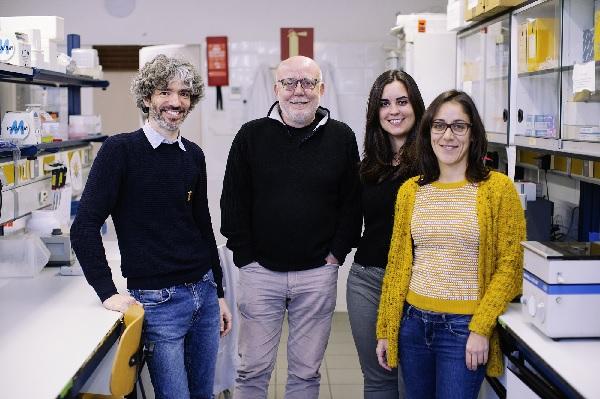Nucleosides: essential biomolecules for life

Credit: University of Barcelona
A research team has described the first case of a patient affected by dysfunctions in a nucleoside transporter of the SLC28 gene family, which brings a set of genes which were not related to human pathologies in the scientific bibliography so far. In particular, the new study has identified mutations in the SLC28A1 gene, which could affect the synthesis of the hCNT1 protein and therefore, alter the pyrimidine metabolism (organic compounds with a role key in cell physiology).
The new study, published in the journal BBA Molecular Basis of Disease, is led by Professor Marçal Pastor-Anglada, from the Faculty of Biology and the Institute of Biomedicine of the University of Barcelona (IBUB), IRSJD and CIBEREHD, and Professor André B.P van Kuilenburg, from the Laboratory of Genetic Metabolic Diseases and the University of Amsterdam (the Netherlands).
Other participants in this scientific article, whose first signers are Sandra Pérez-Torras and Aida Mata-Ventosa (UB-IBUB-IRSJD-CIBERhed), are Albert Viel-Oliva (UB-IBUB-IRSJD-CIBEREHD), Axel Bidon-Chanal (Faculty of Pharmacy and Food Sciences and Torribera Food and Nutrition Campus of the UB, IBUB and IQTCUB) and other experts from the University of British Columbia and the University of Calgary (Canada).
Nucleosides: essential biomolecules for life
Nucleosides are biomolecules formed by a nitrogenous base (adenine, guanine, cytosine, thymine, or uracil) linked to a sugar (pentose) which are essential in many biological processes (synthesis in nucleic acids, energetic metabolism, etc.). These biomolecules can be synthetized by the cell -de novo synthesis- or can be obtained from the extracellular space through membrane proteins: nucleoside transporters, which are grouped in two gene families: SLC28 and SLC29.
In particular, nucleoside transporters of the SLC28 family are highly selective proteins and with substrate preference (the biomolecules they transport). In general, these are involved in the control of cellular processes to recover and reuse the nucleosides as nucleotides (nucleosides joint to a phosphorus acid) for the synthesis of nucleic acids.
First mutation described in the SLC28 gene family
In particular, the SLC29 gene family includes three coding genes for the hCNT1, hCNT2 and hCNT3 proteins, which are concentrative nucleoside transporters (CNT). Now, this study identifies for the first time mutations in the SLC28A1 gene -which drives the synthesis of the hCNT1 protein- which cause a functional deficiency (in this case, the first genetic dysfunction described in the SLC28 gene family).
In particular, the hCNT1 protein is a specific transporter for pyrimidine nucleosides “with different physiological functions, some of them not enough known about” according to Professor Marçal Pastor-Anglada, member of the Sant Joan de Déu Research Institute (IRSJD) and the Liver and Digestive Diseases Networking Biomedical Research Centre (CIBEREHD).
“In the kidney -continues Pastor Anglada- the hCNT1 protein eases the renal tubular re-uptake of pyrimidines, compounds from which the nitrogenous basis of nucleic acids derive. This fact would explain why the patient affected by the mutation can show biochemical alterations such as pyrimidinuria, a disorder of the pyrimidine metabolism that causes a major excretion of the nucleosides uridine and cytidine through urine”.
Nucleoside transporters: searching for new mutations
Within the gene families of membrane transporters, only mutations of the SLC29A3 gene had been described so far, which are linked to pathologies in humans. This gene codes the synthesis of the hENT3 protein, an equilibrative nucleoside transporter (ENT) related to several minority pathologies.
According to previous studies, the H syndrome, pigmented hypertricosis, insulin-dependent diabetes mellitus syndrome, the Rosai-Dorfman disease and Faisalabad histiocytosis are some of the pathologies that are linked to the mutation of the SLC29A3 gene affecting the hENT3 protein. In this context, the team led by Professor Marçal Pastor Anglada took part in the diagnosis of the first patients in Spain who were affected by the H syndrome, a gene-based rare disease (Biochemical and Biophysical Research Communications, 2012).
At the moment, thirty-four clinical dysfunctions have been described in humans, and these affect direct or indirectly the nucleoside metabolism. “Despite being minority pathologies, everything points out to the fact that the number of involved genes is important”, notes Pastor-Anglada, director of IBUB and the Consolidated Research Group on Molecular Pharmacology and Experimental Therapies (MPET) of the UB.
From basic research to the design of future therapies
Some nucleoside transporters can be the way to enter the cell of other molecules (drugs to treat tumours, viral and inflammatory diseases). Therefore, these molecules could be the core of new therapeutic approaches to inhibit the development and proliferation of tumor cells. Fluoropyrimidine, for instance, are the group of anticancer drugs preferably obtained for the hCNT1 protein, a molecule with an altered expression in some tumors. Therefore, this protein and other nucleoside transporters can be regarded as targets and potential biomarkers in the fight against neoplastic processes.
Although de novo synthesis metabolic routes and cell recovery routes related to nucleosides are known, there are still many doubts on how they regulate and interact. Knowing the genic and protein networks that take part in the modelling of paths, and in more detail, determining the role of nucleoside transporters in the cell recovery are some of the challenges to be treated in future studies.
“In this field of knowledge, the therapeutic involvement margin is low. Some restitution therapies for the nucleotide levels are considered in the group of diseases where the nucleoside recovery is affected -some of them grouped under the mitochondrial DNA depletion. However, these initiatives are under experimental phases and have just reached the clinical phase in palliative therapies”, concludes Marçal Pastor-Anglada.
###
Media Contact
Rosa Martínez
[email protected]
34-934-031-335
Related Journal Article
http://dx.




